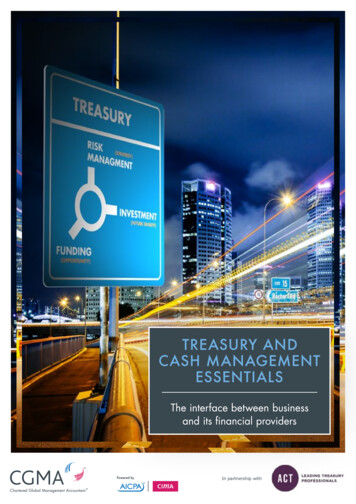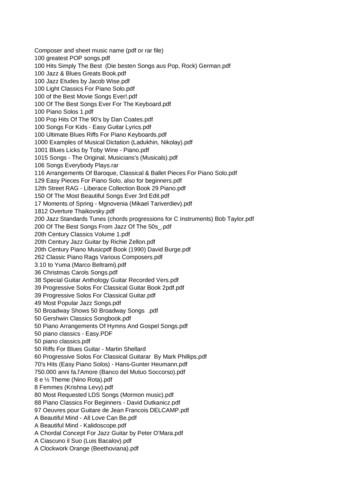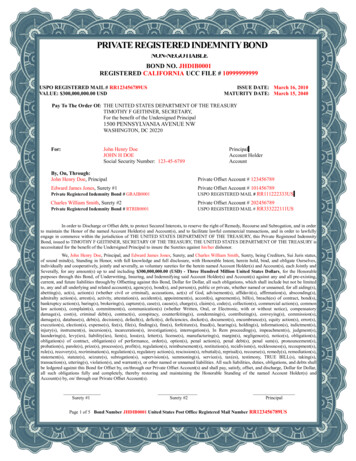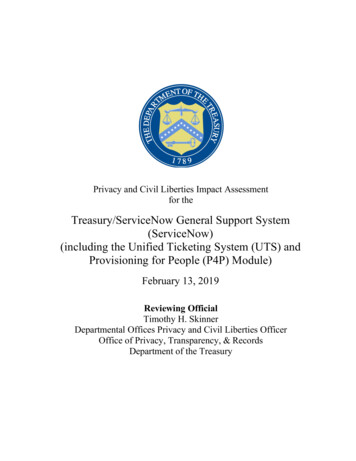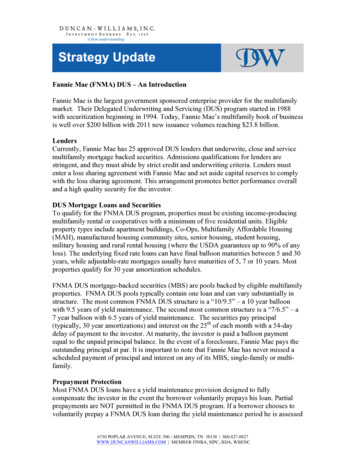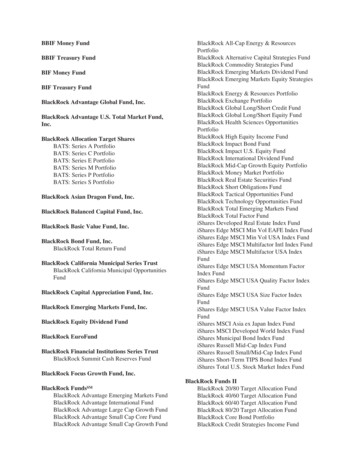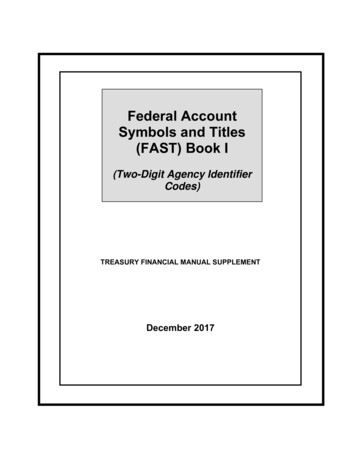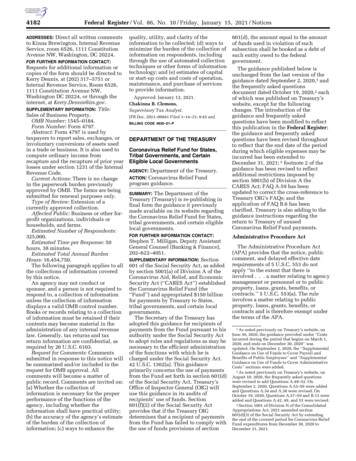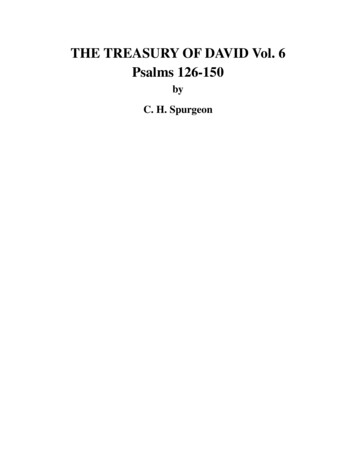
Transcription
THE TREASURY OF DAVID Vol. 6Psalms 126-150byC. H. Spurgeon
Psalm 126PSALM 126.Title.A Song of Degrees. This is the seventh Step, and we may therefore expect tomeet with some special perfection of joy in it; nor shall we look in vain. We see here notonly that Zion abides, but that her joy returns after sorrow. Abiding is not enough,fruitfulness is added. The pilgrims went from blessing to blessing in their psalmody asthey proceeded on their holy way. Happy people to whom ever ascent was a song, everyhalt a hymn. Here the trustor becomes a sower: faith works by love, obtains a presentbliss, and secures a harvest of delight.There is nothing in this psalm by which we can decide its date, further than this,that itis a song after a great deliverance from oppression. "Turning captivity" by no meansrequires an actual removal into banishment to fill out the idea; rescue from any direaffliction or crushing tyranny would be fitly described as "captivity turned." Indeed, thepassage is not applicable to captives in Babylon, for it is Zion itself which is in captivityand not a part of her citizens: the holy city was in sorrow and distress; though it could notbe removed, the prosperity could be diminished. Some dark cloud lowered over thebeloved capital, and its citizens prayed "Turn again our captivity. O Lord."This psalm is in its right place and most fittingly follows its predecessor, for as in Ps125:1-5, we read that the rod of the wicked shall not rest upon the lot of the righteous, wehere see it removed from them to their great joy. The word "turn" would seem to be thekeynote of the song: it is a Psalm of conversion conversion from captivity; and it maywell be used to set forth the rapture of a pardoned soul when the anger of the Lord isturned away from it. We will call it, "Leading captivity captive."The Psalm divides itself into a narrative (Ps 126:1-2), a song (Ps 126:3), a prayer (Ps126:4), and a promise (Ps 126:5-6).EXPOSITION.Ver. 1. When the Lord turned again the captivity of Zion, we were like them thatdream. Being in trouble, the gracious pilgrims remember for their comfort times ofnational woe which were succeeded by remarkable deliverances. Then sorrow was gonelike a dream, and the joy which followed was so great that it seemed too good to be true,and they feared that it must be the vision of an idle brain. So sudden and sooverwhelming was their joy that they felt like men out of themselves, ecstatic, or in atrance. The captivity had been great, and great was the deliverance; for the great Godhimself had wrought it: it seemed too good to be actually true: each man said to himself,"Is this a dream? O if it be a dream,2
Let me sleep on, and do not wake me yet."It was not the freedom of an individual which the Lord in mercy had wrought, but of allZion, of the whole nation; and this was reason enough for overflowing gladness. We neednot instance the histories which illustrate this verse in connection with literal Israel; but itis well to remember how often it has been true to ourselves. Let us look to the prisonhouses from which we have been set free. Ah, me, what captives we have been! At ourfirst conversion what a turning again of captivity we experienced. Never shall that hourbe forgotten. Joy! Joy! Joy! Since then, from multiplied troubles, from depression ofspirit, from miserable backsliding, from grievous doubt, we have been emancipated, andwe are not able to describe the bliss which followed each emancipation."When God reveal'd his gracious nameAnd changed our mournful state,Our rapture seem'd, a pleasing dream,The grace appeared so great."This verse will have a higher fulfilment in the day of the final overthrow of the powers ofdarkness when the Lord shall come forth for the salvation and glorification of hisredeemed. Then in a fuller sense than even at Pentecost our old men shall see visions, andour young men shall dream dreams: yea, all things shall be so wonderful, so far beyondall expectation, that those who behold them shall ask themselves whether it be not all adream. The past is ever a sure prognostic of the future; the thing which has been is thething that shall be: we shall again and again find ourselves amazed at the wonderfulgoodness of the Lord. Let our hearts gratefully remember the former loving kindnesses ofthe Lord: we were sadly low, sorely distressed, and completely past hope, but whenJehovah appeared he did not merely lift us out of despondency, he raised us intowondering happiness. The Lord who alone turns our captivity does nothing by halves:those whom he saves from hell he brings to heaven. He turns exile into ecstasy, andbanishment into bliss.EXPLANATORY NOTES AND QUAINT SAYINGS.Title. Augustine interprets the title, "A Song of Degrees, i.e. a Song of drawingupwards", of the drawing (going) up to the heavenly Jerusalem. This is right, inasmuch asthe deliverance from the captivity of sin and death should in an increased measure excitethose feelings of gratitude which Israel must have felt on being delivered from theircorporeal captivity; in this respect again is the history of the outward theocracy a type ofthe history of the church. Augustus F. Tholuck, 1856.Whole Psalm. In its Christian aspect the psalm represents the seventh of the "degrees" inour ascent to the Jerusalem that is above. The Christian's exultation at his deliverancefrom the spiritual captivity of sin. H. T. Armfield.3
Whole Psalm. In mine opinion they go near to the sense and true meaning of the Psalmwho do refer it to that great and general captivity of mankind under sin, death and thedevil, and to the redemption purchased by the death and blood shedding of Christ, andpublished in the Gospel. For this kind of speech which the Prophet useth here is ofgreater importance than that it may be applied only to Jewish particular captivities. Forwhat great matter was it for these people of the Jews, being, as it were, a little handful, tobe delivered out of temporal captivity, in comparison of the exceeding and incomparabledeliverance whereby mankind was set at liberty from the power of their enemies, nottemporal, but eternal, even from death, Satan and hell itself? Wherefore we take thisPsalm to be a prophecy of the redemption that should come by Jesus Christ, and thepublishing of the gospel, whereby the kingdom of Christ is advanced, and death and thedevil with all the powers of darkness are vanquished. Thomos Stint, in An Expositionon Psalms 124-126, 1621.Whole Psalm. I believe this psalm is yet once more to be sung in still more joyous strain;once more will the glad tidings of Israel's restoration break upon her scattered tribes, likethe unreal shadow of a dream; once more will the inhabitants of the various lands fromamong whom they come forth exclaim in adoring wonder, "The Lord hath done greatthings for them", when they see Israelite after Israelite and Jew after Jew, as on thatwondrous night of Egypt, with their loins girded, their shoes on their feet, and their staffin their hand, hasting to obey the summons that recalls them to their own loved land!Barton Bouchier (1794-1865), in "Manna in the Heart."Whole PsalmWhen, her sons from bonds redeeming,God to Zion led the way,We were like to people dreamingThoughts of bliss too bright to stay.Fill'd with laughter, stood we gazing,Loud our tongues in rapture sang;Quickly with the news amazingAll the startled nations rang."See Jehovah's works of glory!Mark what love for them he had!""Yes, FOR US! Go tell the story.4
This was done, and we are glad."Lord! thy work of grace completingAll our exiled hosts restore,As in thirsty channels meetingSouthern streams refreshing pour.They that now in sorrow weepingTears and seed commingled sow,Soon, the fruitful harvest reaping,Shall with joyful bosoms glow.Tho' the sower's heart is breaking,Bearing forth the seed to shed,He shall come, the echoes waking,Laden with his sheaves instead.William Digby Seymour, in "The Hebrew Psalter. A New Metrical Translation", 1882.Ver. 1. When the Lord turned again the captivity. As by the Lord's permission theywere led into captivity, so only by his power they were set at liberty. When the Israeliteshad served in a strange land four hundred years, it was not Moses, but Jehovah, thatbrought them out of the land of Egypt, and out of the house of bondage. In like manner itwas he and not Deborah that freed them for Jabin after they had been vexed twenty yearsunder the Canaanites. It was he and not Gideon that brought them out of the hands of theMidianites, after seven years' servitude. It was he and not Jephthah that delivered themfrom the Philistines and Amorites after eighteen years' oppression. Although in all thesehe did employ Moses and Deborah, Gideon and Jephthah, as instruments for theirdeliverance; and so it was not Cyrus's valour, but the Lord's power; not his policy, butGod's wisdom, that, overthrowing the enemies, gave to Cyrus the victory, and put it intohis heart to set his people at liberty; for he upheld his hands to subdue nations. He didweaken the loins of kings, and did open the doors before him, he did go before him, andmade the crooked places straight; and he did break the brazen doors, and burst the ironbars. Isa 45:1-2. John Hume, in "The Jewes Deliverance", 1628.Ver. 1. In Jehovah's turning (to) the turning of Zion. Meaning to return to the, or meetthose returning, as it were, half way. The Hebrew noun denotes conversion, in its spiritual5
sense, and the verb God's gracious condescension in accepting or responding to it.Joseph Addison Alexander.Ver. 1. The captivity of Zion. I ask, first, Why of Zion? why not the captivity ofJerusalem, Judah, Israel? Jerusalem, Judah, Israel, were led away captives, no less thanZion. They, the greater and more general; why not the captivity of them, but of Zion? Itshould seem there is more in Zion's captivity than in the rest, that choice is made of itbefore the rest. Why? what was Zion? We know it was but a hill in Jerusalem, on thenorth side. Why is that hill so honoured? No reason in the world but this, that upon itthe Temple was built; and so, that Zion is much spoken of, and much made of, it is onlyfor the Temple's sake. For whose sake it is (even for his church), that "the Lord loveth thegates of Zion more than all the dwellings of Jacob" (Ps 87:2); loveth her more, and so hercaptivity goeth nearer him, and her deliverance better pleaseth him, than all Jacobbesides. This maketh Zion's captivity to be mentioned chiefly, as chiefly regarded byGod, and to be regarded by his people. As we see it was: when they sat by the waters ofBabylon, that which made them weep was, "When we remembered thee, O Zion"; thatwas their greatest grief. That their greatest grief, and this their greatest joy; Loetatisumus, when news came (not, saith the Psalm, in domos nostras, We shall go everyone tohis own house, but) in domun Domini ibimus, "We shall go to the house of the Lord, weshall appear before the God of gods in Zion." Lancelot Andrews, 1555-1626.Ver. 1. We were like them that dream. That is, they thought it was but mere fantasyand imagination. Sydraeh Simpson, 1658.Ver. 1. We were like them that dream. Here you may observe that God doth often sendsuccour and deliverance to the godly in the time of their affliction, distress, and adversity;that many times they themselves do doubt of the truth thereof, and think that in very deedthey are not delivered, but rather that they have dreamed. Peter, being imprisoned byHerod, when he was delivered by an angel, for all the light that did shine in the prison;though the angel did smite him on the side and raised him up; though he caused thechains to fall off his hands; though he spake to him three several times, Surge, einge,circunda;"Arise quickly, gird thyself, and cast thy garment about thee"; though heconducted him safely by the watches; and though he caused the iron gates to openwillingly; yet for all this he was like unto them that dream. "For he wist not that it wastrue which was done by the angel; but thought he saw a vision": Ac 11:9. When old Jacobwas told by his sons that his son Joseph was alive, his heart failed, and he believed themnot; but when he had heard all that Joseph had said, and when he saw the chariots thatJoseph had sent, then, as it were, raised from a sleep, and awakened from a dream, hisspirit revived, and, rejoicing, he cried out, "I have enough; Joseph my son is yet alive."Lorinus seems to excuse this their distrust, because they were so over ravished with joy,that they misdoubted the true cause of their joy: like the Apostles, who having Christafter his resurrection standing before them, they were so exceedingly joyed, that rejoicingthey wondered and doubted; and like the two Marys, when the angel told them of ourSaviour Christ's resurrection, they returned from the sepulchre rejoicing, and yet withal6
fearing. It may be they feared the truth of so glad news, and doubted lest they weredeceived by some apparition. John HumeVer. 1. We were like them that dream. We thought that we were dreaming; we couldhardly believe our eyes, when at the command of Cyrus, king of the Persians, we hadreturned to our own land. The same thing happened to the Greeks, when they heard thattheir country, being conquered by the Romans, had been made free by the Roman consul,P. Quinctius Flaminius. Livy says that when the herald had finished there was more goodnews than the people could receive all at once. They could scarcely believe that they hadheard aright. They were looking on each other wonderingly, like sleepers on an emptydream. John Le Clerc Clericus, 1657-1736.Ver. 1. We were like them that dream, etc. In the lapse of seventy years the hope ofrestoration to their land, so long deferred, had mostly gone out in despair, save as it rested(in some minds) on their faith in God's promise. The policy of those great powers in theEast had long been settled, viz., to break up the old tribes and kingdoms of Western Asia;take the people into far eastern countries, and never let them return. No nation known tohistory, except the Jews, ever did return to rebuild their ancient cities and homes. Hencethis joyous surprise. Henry Cowles, in "The Psalms; with Notes", 1872.Ver. 1. Like them that dream. It was no dream; it was Jacob's dream become a reality.It was the promise, "I will bring thee back into this land" (Ge 28:15), fulfilled beyond alltheir hope. William Kay, in "The Psalms, with Notes, chiefly exegetical", 1871.Ver. 1. We were like them that dream. The words should rather be translated, "We arelike unto those that are restored to health." The Hebrew word signifies to recover, or, tobe restored to health. And so the same word is translated in Isa 38:1-22, when Hezekiahrecovered, he made a psalm of praise, and said, "O Lord, by these things men live, and inall these things is the life of my spirit: so wilt thou recover me, and make me to live." It isthe same word that is used here. Thus Cajetan, Shindior, and others would have ittranslated here; and it suits best with the following words, "Then were our mouths filledwith laughter, and our tongues with praise." When a man is in a good dream, his mouth isnot filled with laughter, nor his tongue with praise: if a man be in a bad dream, his mouthis not filled with laughter, nor his tongue with praise; but when a man is restored to healthafter a great sickness, it is so. William Bridge, 1600-1670.HINTS TO PREACHERS.Ver. 1.1. Sunny memories of what the Lord did, "he turned again thecaptivity", etc.2. Singular impressions,3. Special discoveries7we could not believe it to be true.it was true, abiding, etc.
Ver. 1. A comparison and a contrast.1. The saved like them that dream.a) In the strangeness of their experience.b) In the ecstasy of their joy.2. The saved unlike them that dream.a) In the reality of their experience. Dreams areunsubstantial things, but "the Lord turned" an actual fact.b) In their freedom from disappointment. No awakening tofind it "but a dream": see Isa 29:8.3. In the endurance of their joy. The joy of dreams is soonforgotten, but this is "everlasting joy." W. H. J. P.Psalms 126:2EXPOSITION.Ver. 2. Then was our mouth filled with laughter, and our tongue with singing. Sofull were they of joy that they could not contain themselves. They must express their joyand yet they could not find expression for it. Irrepressible mirth could do no other thanlaugh, for speech was far too dull a thing for it. The mercy was so unexpected, soamazing, so singular that they could not do less than laugh; and they laughed much, sothat their mouths were full of it, and that because their hearts were full too. When at lastthe tongue could move articulately, it could not be content simply to talk, but it mustneeds sing; and sing heartily too, for it was full of singing. Doubtless the former painadded to the zest of the pleasure; the captivity threw a brighter colour into theemancipation. The people remembered this joy flood for years after, and here is therecord of it turned into a song. Note the when and the then. God's when is our then. Atthe moment when he turns our captivity, the heart turns from its sorrow; when he fills uswith grace we are filled with gratitude. We were made to be as them that dream, but weboth laughed and sang in our sleep. We are wide awake now, and though we can scarcelyrealize the blessing, yet we rejoice in it exceedingly.Then said they among the heathen, the Load hath done great things for them. Theheathen heard the songs of Israel, and the better sort among them soon guessed the causeof their joy. Jehovah was known to be their God, and to him the other nations ascribedthe emancipation of his people, reckoning it to be no small thing which the Lord had thusdone; for those who carried away the nations had never in any other instance restored a8
people to their ancient dwelling place. These foreigners were no dreamers; though theywere only lookers on, and not partakers in the surprising mercy, they plainly saw whathad been done, and rightly ascribed it to the great Giver of all good. It is a blessed thingwhen saints set sinners talking about the lovingkindness of the Lord: and it is equallyblessed when the saints who are hidden away in the world hear of what the Lord has donefor his church, and themselves resolve to come out from their captivity and unite with theLord's people. Ah, dear reader, Jehovah has indeed done marvellous things for hischosen, and these "great things" shall be themes for eternal praise among all intelligentcreatures.EXPLANATORY NOTES AND QUAINT SAYINGS.Ver. 2. Then was our mouth filled with laughter, etc. We must earnestly endeavour tolearn this practice, or at the least to attain to some knowledge thereof; and we must raiseup ourselves with this consideration that the gospel is nothing else but laughter and joy.This joy properly pertaineth to captives, that is, to those that feel the captivity of sin anddeath; to the fleshy and tender hearts, terrified with the feeling of the wrath and judgmentof God. These are the disciples in whose hearts should be planted laughter and joy, andthat by the authority of the Holy Ghost, which this verse setteth forth. This people was inZion, and, after the outward show of the kingdom and priesthood, did mightily flourish;but if a man consider them according to the spirit, he shall see them to be in miserablecaptivity, and that their tongue is full of heaviness and mourning, because their heart isterrified with the sense of sin and death. This is Moses' tongue or Moses' mouth, full ofwormwood and of the bitterness of death; wherewith he designs to kill none but thosewhich are too lively and full of security. But they who feel their captivity shall have theirmouths filled with laughter and joy: that is, redemption and deliverance from sin anddeath shall be preached unto them. This is the sense and meaning of the Holy Ghost, thatthe mouth of such shall be filled with laughter, that is, their mouth shall show forthnothing else but great gladness through the inestimable consolations of the gospel, withvoices of triumph and victory by Christ, overcoming Satan, destroying death, and takingaway sins. This was first spoken unto the Jews; for this laughter was first offered to thatpeople, then having the promises. Now he turneth to the Gentiles, whom he calleth to thepartaking of this laughter. Martin Luther.Ver. 2. Then was our mouth filled with laughter, etc. It was thus in the valley of Elah,where Goliath fell, and Philistia fled. It was thus at Baal Perazim. It was thus when onemorning, after many nights of gloom, Jerusalem arose at dawn of day, and foundSennacherib's thousands a camp of the dead. And it has all along been the manner of ourGod."The Lord has wrought mightilyIn what he has done for us;And we have been made glad."9
Ever do this till conflict is over! Just as thou dost with the streams of the south, year byyear, so do with us with all, with each. And we are confident thou wilt; we are sure thatwe make no vain boast when we sing this psalm as descriptive of the experience of all thypilgrims and worshippers. Andrew A. Bonar, in "Christ and his Church in the Book ofPsalms", 1859.Ver. 2. Then was our mouth filled with laughter. They that were laughed at, nowlaugh, and a new song is put into their mouths. It was a laughter of joy in God, not scornof their enemies. Matthew Henry.Ver. 2. Mouth, tongue. Lorinus, the Jesuit, hath observed that the Psalmist nominatesthe mouth and tongue in the singular, not mouths and tongues in the plural; because allthe faithful and the whole congregation of the Jews univoce, with one voice, with oneconsent, and, as it were, with one mouth, did praise and glorify the Lord. John Hume.Ver. 2. And our tongue with singing. Out of the abundance of the heart the mouthspeaks; and if the heart be glad the tongue is glib. Joy cannot be suppressed in the heart,but it must be expressed with the tongue. John Hume.Ver. 2. Then said they among the heathen. And what is it they said? It is to thepurpose. In this (as in many others) the heathens' saying cannot be mended. This theysay: 1. That they were no quotidian, or common things; but "great". 2. Then, these greatthings they ascribe not to chance;that they happened not, but were "done". 3. Then,"done" by God himself:they see God in them. 4. Then, not done by God at random,without any particular aim; but purposely done for them. 5. And yet, there is more inmagnificavit facere (if we look well). For, magna fecit would have served all this; but insaying "magnificavit facere", they say magnifecit illos, ut magna faceret pro illis. Hemagnified them, or set greatly by them, tor whom he would bring to pass so great a work.This said they among the "heathen."And it is pity the "heathen" said it, and that the Jew's themselves spake not these wordsfirst. But now, finding the "heathen" so saying; and finding it was all true that they said,they must needs find themselves bound to say at least as much; and more they could notsay; for more cannot be said. So much then, and no less than they. And this addeth adegree to the dicebant, that the sound of it was so great among the heathen that it madean echo even in Jewry itself. Lancelot Andrews.Ver. 2. The Lord hath done great things. He multiplied to do great things;so theChaldee, Syriac, and Arabic versions render it; and the history of this deliverance makesit good. Thomas Hodges, in a Sermon entitled "Sion's Hallelujah", 1660.Ver. 2-3. There is this great difference between the praise which the heathen are forced togive to God, and that which the Lord's people heartily offer unto him: the one doth speakas having no interest nor share in the mercy; the other do speak as they to whom themercy is intended, and wherein they have their portion with others: He hath done great10
things for them, say the heathen: but, he hath done great things for us, say the Lord'speople. David Dickson, 1583-1662.HINTS TO PREACHERS.Ver. 2. Saintly laughter. What creates it, and how it is justified.Ver. 2. Recipe for holy laughter.1. Lie in prison a few weeks.2. Hear the Lord turning the key.3. Follow him into the high road.4. Your sky will burst with sunshine, and your heart with song andlaughter.5. If this recipe is thought too expensive, try keeping in the highroad. W. B. H.Ver. 2-3.1. Reports of God's doings.2. Experience of God's doings.Ver. 2-3.1. The Lord does great things for his people.2. These great things command the attention of the world.3. They inspire the joyful devotion of the saints.W. H. J. P.Psalms 126:3EXPOSITION.Ver. 3. The LORD hath done great things for us; whereof we are glad. They did notdeny the statement which reflected so much glory upon Jehovah: with exultation theyadmitted and repeated the statement of Jehovah's notable dealings with them. Tothemselves they appropriated the joyful assertion; they said "The Lord hath done greatthings for us", and they declared their gladness at the fact. It is a poor modesty which is11
ashamed to own its joys in the Lord. Call it rather a robbery of God. There is so little ofhappiness abroad that if we possess a full share of it we ought not to hide our light undera bushel, but let it shine on all that are in the house. Let us avow our joy, and the reasonof it, stating the "whereof" as well as the fact. None are so happy as those who arc newlyturned and returned from captivity; none can more promptly and satisfactorily give areason for the gladness that is in them, the Lord himself has blessed us, blessed usgreatly, blessed us individually, blessed assuredly; and because of this we sing unto hisname. I heard one say the other day in prayer "whereof we desire to be glad." Strangedilution and defilement of Scriptural language! Surely if God has done great things for uswe are glad, and cannot be otherwise. No doubt such language is meant to be lowly, butin truth it is loathsome.EXPLANATORY NOTES AND QUAINT SAYINGS.Ver. 3. The Lord hath done great things for us, etc. This verse is the marrow of thewhole psalm, occasioned by the return of God's people out of Babel's captivity into theirown country. Their deliverance was so great and incredible that when God brought it topass they were as men in a dream, thinking it rather a dream, and a vain imagination, thana real truth. 1. Because it was so great a deliverance from so great and lasting a bondage,it seemed too good to be true. 2. It was sudden and unexpected, when they little thoughtor hoped for it.3. All things seemed desperate, nothing more unlikely, or impossiblerather. 4. The manner was so admirable (without the counsel, help, or strength of man:nay, it was beyond and against all human means); that they doubt whether these things benot the dreams of men that are awake. Thomas Taylor (1576-1632), in "A Mappe ofPwme."EXPLANATORY NOTES AND QUAINT SAYINGS.Ver. 3. For us. What were we, might Sion say (who were glad to lick the dust of the feetof our enemies), that the Lord of heaven and earth should look so graciously upon us?The meanness of the receiver argues the magnificence of the giver. "Who am I, that themother of my Lord should visit me?" this was a true and religious compliment of devoutElizabeth. The best of men are but the children of dust, and grandchildren of nothing.And yet for the Lord to do great things for us! this yet greatens those "great things".Was it because we were his church? It was his super abounding grace to select us out ofothers, as it was our greater gracelessness, above all others, so to provoke him, as to forcehim to throw us into captivity. Or was it because our humiliation, in that disconsolatecondition, did move him to so great compassion? Alas! there was a choice of nationswhom he might have taken in our room, that might have proved far more faithful than wehave been for the one half of those favours we have enjoyed.Or was it for his covenant's sake with our forefathers? Alas! we had forfeited that longsince, again and again, we know not how often. Wherefore, when we rememberourselves, we cannot but make this an aggravation of God's "great things", that he shoulddo them for us, FOR US, so very, very unworthy. Malachiah or Matthew Harris, in aSermon entitled "Brittaines Hallelujah", 1639.12
HINTS TO PREACHERS.Ver. 3. The LORD hath done great things for us. In this acknowledgment andconfession there are three noteworthy points of thankfulness.1. That they were "great things" which were done.2. Who it was who did them: "the Lord."3. That they are done: not against us, but "for us."Alexander Henderson, 1583-1646.Psalms 126:4EXPOSITION.Ver. 4. Turn again our captivity, O LORD. Remembering the former joy of a pastrescue they cry to Jehovah for a repetition of it. When we pray for the turning of ourcaptivity, it is wise to recall former instances thereof: nothing strengthens faith moreeffectually than the memory of a previous experience. "The Lord hath done" harmonizeswell with the prayer, "Turn again." The text shows us how wise it is to resort anew to theLord, who in former times has been so good to us. Where else should we go but to himwho has done such great things for us? Who can turn again our captivity but he whoturned it before?As the streams in the south. Even as the Lord sends floods down on the dry beds ofsouthern torrents after long droughts, so can he fill our wasted and wearied spirits withfloods of holy delight. This the Lord can do for any of us, and he can do it at once, fornothing is too hard for the Lord. It is well for us thus to pray, and to bring our suit beforehim who is able to bless us exceeding abundantly. Do not let us forget the past, but in thepresence of our present difficulty let us resort unto the Lord, and beseech him to do thatfor us which we cannot possibly do for ourselves, that which no other power canperform on our behalf. Israel did return from the captivity in Babylon, and it was even
Psalm to be a prophecy of the redemption that should come by Jesus Christ, and the publishing of the gospel, whereby the kingdom of Christ is advanced, and death and the devil with all the powers of darkness are vanquished. ²Thomos Stint, in An Exposition on Psalms 124-126,1621. Whole Psalm.
